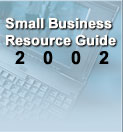 |
| |
| |
| |
| |
| |
| |
| |
| |
| |
| |
| |
| |
| |
| |
| |
|
Starting Your Business/Keeping Tax RecordsWhat are Business ExpensesTaxesYou can deduct as business expenses various federal, state, and local taxes directly attributable to your business. Income taxes. You can deduct on Schedule C or C-EZ a state tax on gross income (as distinguished from net income) directly attributable to your business. You can deduct any other state and local income taxes if you itemize deductions on Schedule A (Form 1040). Do not deduct federal income tax. Employment taxes. You can deduct the social security, Medicare, and federal unemployment (FUTA) taxes you paid out of your own funds as an employer. These taxes are explained in Chapter 1 of Publication 334 Tax Guide for Small Business. You can also deduct payments you made as an employer to a state unemployment compensation fund or to a state disability benefit fund. Self-employment tax. You can deduct half of your self-employment tax on line 26 of Form 1040. Self-employment tax is explained in Chapter 1 of Publication 334 Tax Guide for Small Business. Personal property tax. You can deduct as a business expense any tax imposed by a state or local government on personal property used in your business. Registration fees for the right to use property within a state or local area are also deductible as a business expense. Real estate taxes. You can deduct as a business expense the real estate taxes you pay on your business property. Deductible real estate taxes are any state, local, or foreign taxes on real estate levied for the general public welfare. The taxes must be based on the assessed value of the real estate and must be charged uniformly against all property under the jurisdiction of the taxing authority. Sales tax. Sales tax you pay on a service or on the purchase or use of property is treated as part of the cost of the service or property. If the service or the cost or use of the property is a deductible business expense, you can deduct the tax as part of that service or cost. If the property purchased is merchandise for resale, the sales tax is part of the cost of the merchandise. If the property is depreciable, the sales tax is added to the basis for depreciation. Excise taxes. You can deduct on Schedule C or C-EZ all excise taxes you pay or incur as ordinary and necessary expenses of carrying on your business. Excise taxes are discussed briefly in Chapter 1 of Publication 334 Tax Guide for Small Business. Fuel taxes. Taxes on gasoline, diesel fuel, and other motor fuels that you use in your business usually are included as part of the cost of the fuel itself. Do not deduct these taxes as a separate item.
Publication
334
Tax Guide for Small Business |